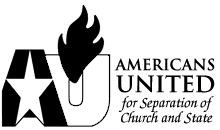
|
Why The Ten Commandments Shouldn't Be Posted In Government Buildings Opponents of church-state separation are increasingly using the Ten Commandments as a tool to promote government-sponsored religion. From city councils to Congress, Religious Right activists and allied public officials are pushing the display of the Decalogue in schools, courthouses and other public buildings. Supporters of the First Amendment have several reasons for opposing these efforts. 1. The U.S. Constitution mandates the separation of church and state. The First Amendment forbids government to meddle in matters of religion. Promotion of religious ideals is the job of America's houses of worship. Government display of the Commandments or any other religious code violates a fundamental tenet of American life, one that has given us more religious liberty than any people in world history. 2. The Supreme Court and lower courts have settled the issue. In 1980's Stone v. Graham decision, the high court struck down a Kentucky law that required public schools to display the Ten Commandments. The justices held that the Commandments are "undeniably a sacred text" and that posting them has a religious purpose. Lower federal courts have struck down Decalogue displays at public buildings as well. Public schools or local governments that exhibit the Commandments are inviting a lawsuit they are almost certain to lose. Government officials should not squander taxpayer dollars on futile litigation. 3. America is religiously diverse. The United States is home to nearly 2,000 different religions, traditions, denominations and sects. While many of these groups revere the Ten Commandments, many do not. If government officials put up the Decalogue, will they also post the Five Pillars of Islam, the Four Noble Truths of Buddhism, the Wiccan Rede and the Affirmations of Humanism? Government should never play favorites when it comes to religion. 4. Religion doesn't need government's help in promoting the Ten Commandments. For a few thousand years, the leaders of Judaism and Christianity have been doing a pretty good job of getting the word out about the Ten Commandments. Interjecting politicians and government bureaucrats into the picture will only introduce an element of politics into the arena of faith. Believers are free to post the Commandments in homes and houses of worship. Government buildings are inappropriate. 5. There is no "standard version" of the Ten Commandments. Different religions and denominations list the Commandments in a faith-specific order, and with different language. When government agencies and public schools post one version and not others, they are taking sides in a frequently contentious theological debate. That simply isn't the government's job. 6. The Ten Commandments are not a "secular" moral code that everyone can agree on. Four of the Ten Commandments are specifically religious in nature. People have fought and died because they disagreed over what constitutes a "false god" or over the meaning of the ban on worshipping a "graven image." Read any history of Europe if you want to see how bad things can get when government decides to take part in debates like these. 7. The Ten Commandments are not a magic charm that can make all of society's problems disappear. Some people treat the Commandments as though they are a lucky rabbit's foot – post them on the wall and all of society's ills will disappear! This is an overly simplistic approach to public policy, and it distracts us from the hard work of solving thorny social problems. 8. The Ten Commandments are open to different interpretations. One Commandment reads, "Thou shall not kill." Or is that "Thou shall not murder"? The language and meaning depends on what version of the Bible you read and your faith's understanding of it. Elsewhere we are admonished to keep holy the Sabbath – but is that Friday, Saturday or Sunday? Religious leaders differ on these questions. They – not politicians – are best suited to interpret the Commandments for their individual congregants. 9. Politicians and interest groups are using the Ten Commandments for political gain. Let's face it, many politicians and special interest groups seem ready these days to use religious symbols and religious language to divide Americans and win elections. Do we really want sanctimonious, poll-obsessed politicians – many of whom don't impose the Ten Commandments on themselves – imposing them on everyone? 10. Political exploitation of the Ten Commandments borders on blasphemy. Religious Right groups and their allies in government use the Ten Commandments to advance their political agenda. They seek votes on support for the Decalogue to advance their faith, and then hope that politicians who oppose such displays can be defeated in the next election. People who believe the Commandments are God's holy word should be appalled at this cynical manipulation of a religious document for crass political gain. Americans United for Separation of Church and State http://www.au.org |